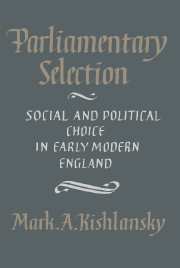Summary
Seventy years separated the election of Sir Maurice Berkeley and John Poulett from that of Sir Richard Temple and Sir Ralph Verney. More than the seasons had passed away. The Somerset election of 1614 was part of a system that stretched back into the past, a system based on status, in which honor and obligation were paramount. The Buckingham election of 1685 was part of a system that stretched forward into the future, a system based on competition for rewards, in which patronage and principle were paramount. Though there were similarities in outward form, at its core parliamentary selection had been transformed. A process of social distinction and community assent had given way to one of political power and electoral consent.
These changes did not take place suddenly, but neither did they evolve gradually. For many county families parliamentary candidacy maintained its hereditary character. In the years between the Armada and the Glorious Revolution three generations of Berkeleys and Pouletts, of Temples and Verneys engaged in parliamentary selections. Activities that pass from fathers to sons acquire their own traditions. But over a longer span, the politicization of county life that the Revolution effected was easily recognizable and can be readily observed one generation removed. Between grandfathers and grandsons ideas about political participation, about the role of Parliament, and about the importance of selection had been transmuted.
It was John Temple, Sir Richard's grandfather, who had leapt too soon into the muddled Buckinghamshire selection of 1588, and who had to weigh the obligations of honor against those of friendship. On that occasion, the timely intervention of a privy councilor prevented a contest that candidates and freeholders abhorred.
- Type
- Chapter
- Information
- Parliamentary SelectionSocial and Political Choice in Early Modern England, pp. 225 - 230Publisher: Cambridge University PressPrint publication year: 1986



